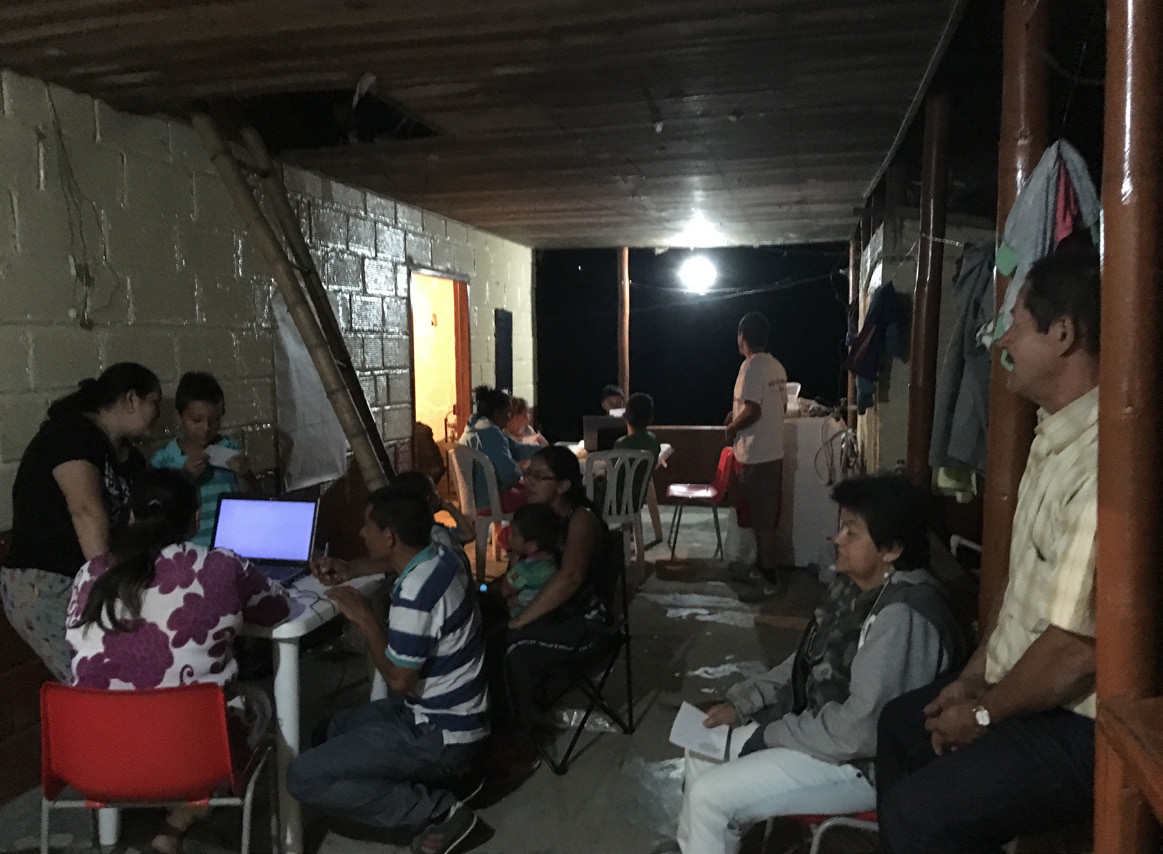Daniel M. Nahum Gomez is a second year MA student in IED.
J. Charles Bradley is a second year EdM student in IED.
In the summer of 2018, Daniel Nahum (M.A. ‘19) and Charles Bradley (Ed.M. ’19) travelled to Colombia to work with the organization SOLE Colombia, to investigate the role Self- Organized Learning Environments (SOLEs) can play in the peace process in Colombia. After the Colombian Peace Agreement was ratified in 2016, the Colombian Ministry of Education and the Ministry of Information Technologies and Communications expanded its Computadores para Educar (Computers to Educate) program with the goal of increasing information and communication technology (ICT) coverage in previously inaccessible public education sectors. The ensuing development of ICT infrastructure outpaced the municipalities’ capacity to build schools; therefore, SOLE Colombia encouraged these communities to use the new infrastructure to create SOLEs, in which students and teachers learn by exploring the topics they find most relevant to their development – ultimately owning their own future.
More research is needed on the link between Self-Organized Learning Environments, peacebuilding, and localized citizenship education. In order to contribute to this field, we piloted the Self-Organized Peace Learning Environment (SOPLE) program in seven locations across central and northern Colombia. The SOLE methodology is a dynamic and flexible three-step process designed to break the hierarchy between teachers and students – creating a more egalitarian facilitator/learner relationship. The first step consists of learners and facilitators democratically co-constructing research questions which they mutually consider important subjects for investigation. In step two, small groups explore the subject matter using local knowledge and any ICT resources available. Finally, an active group-sharing takes place, in which the democratically-led activities serve to promote the co-construction and socialization of knowledge.
The simplicity of the SOLE model, in confluence with its inherently motivating, learner-centered methodology, positions it as a potent tool for culturally relevant civic education in under-resourced Colombian communities. Through the use of open-ended interviews with SOPLE facilitators and classroom observation, the research team collected local perspectives on the potential of self-organized learning environments for effectively expanding culturally relevant forms of peace and citizenship education in the Colombian context.
Qualitative data analyses have shown that SOPLE facilitators value the methodology for four main purposes:
- Promoting Dialogue- The complex nature of post-conflict Colombia makes conversations about social justice and human rights realities difficult. SOPLEs allow participants to frame discussions in a way that is relevant to their own lived experience. A benefit of this process is the elimination of externalized and destructive oversimplifications, which increases the chances of a productive localized civic discussion taking place.
- Preserving Local Values- Facilitators valued SOPLEs local construction and perceived it as a way to preserve local ways of life. Thus, SOPLEs play a crucial role in citizenship education for conflict-affected settings, where the localization of civic epistemologies is paramount for reconstructing community cohesion.
- Creating Trust- After years of internal conflict and a consequential forced migration of more than 7.7 million internally displaced people, building trust is an especially critical goal of citizenship education in Colombia. SOPLE facilitators underscored how the methodology serves an effective tool for promoting trust through co-construction of knowledge and collective problem-solving.
- Promotion of Democracy- Facilitators expressed their enthusiasm for the student-centered learning facilitated by SOPLEs, despite the widespread social acceptance of hierarchical student-teacher relationships. They told the research team how much they valued their students’ opinions and highlighted how SOPLEs reduced their fear of letting students take the lead in the classroom.
This research has shown that SOPLEs have the potential to serve as important tools for localizing civic education. Moreover, through this process of reducing externalization, community members augment their own collective agency in an intrinsically participatory and liberating manner. The research team hopes to continue their investigation into the power of self-organized learning for promoting localized civic education by returning to expand the initial study to more sites across Colombia.
